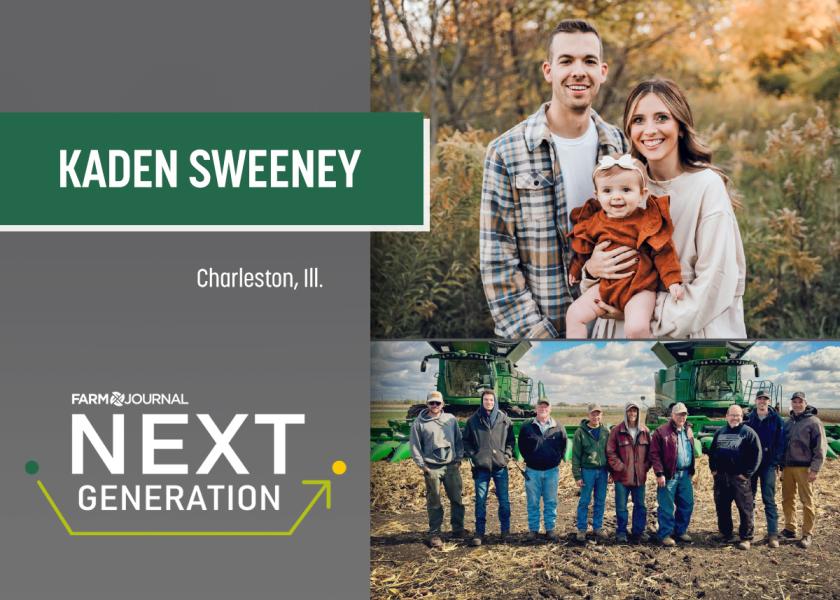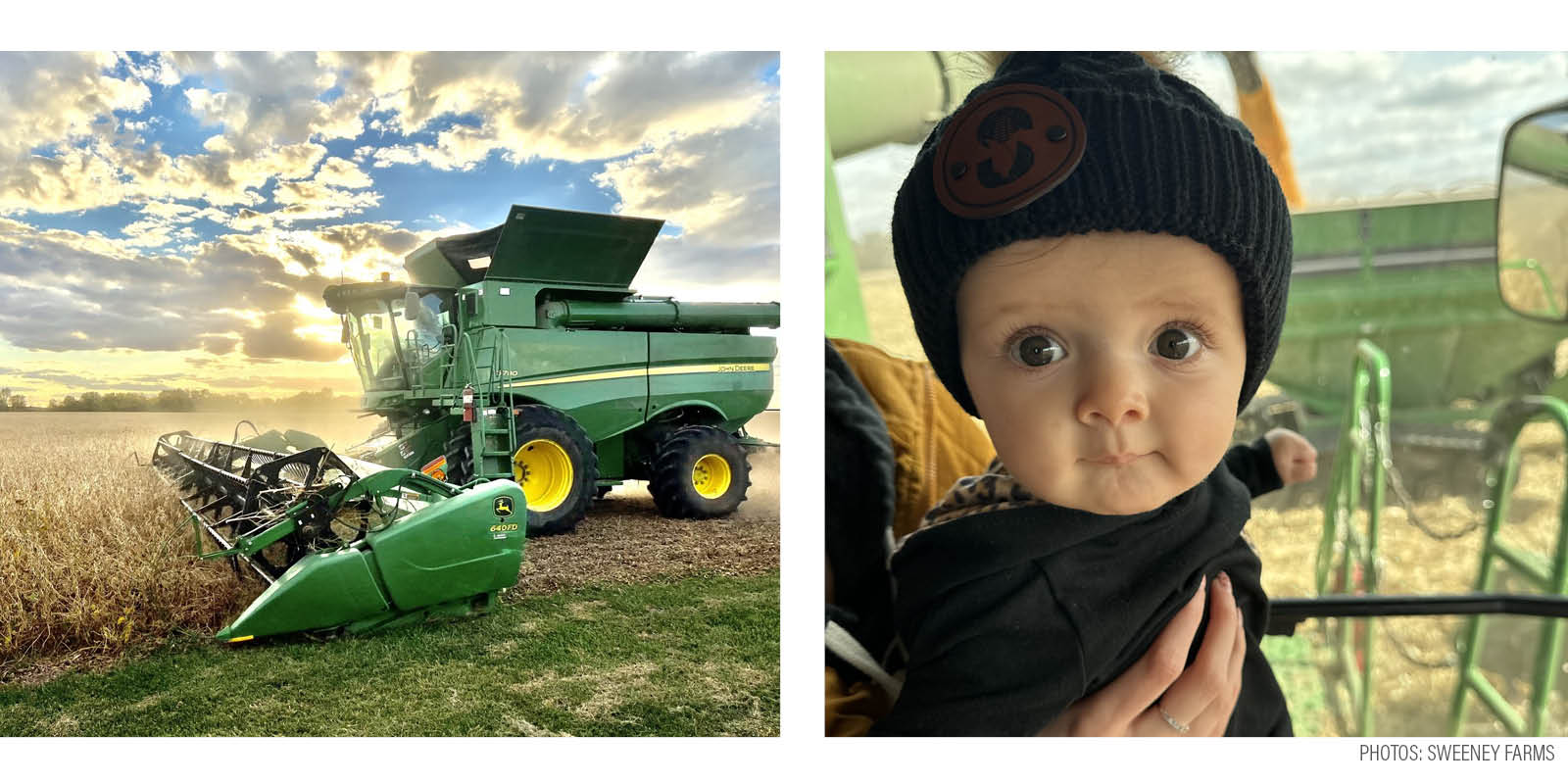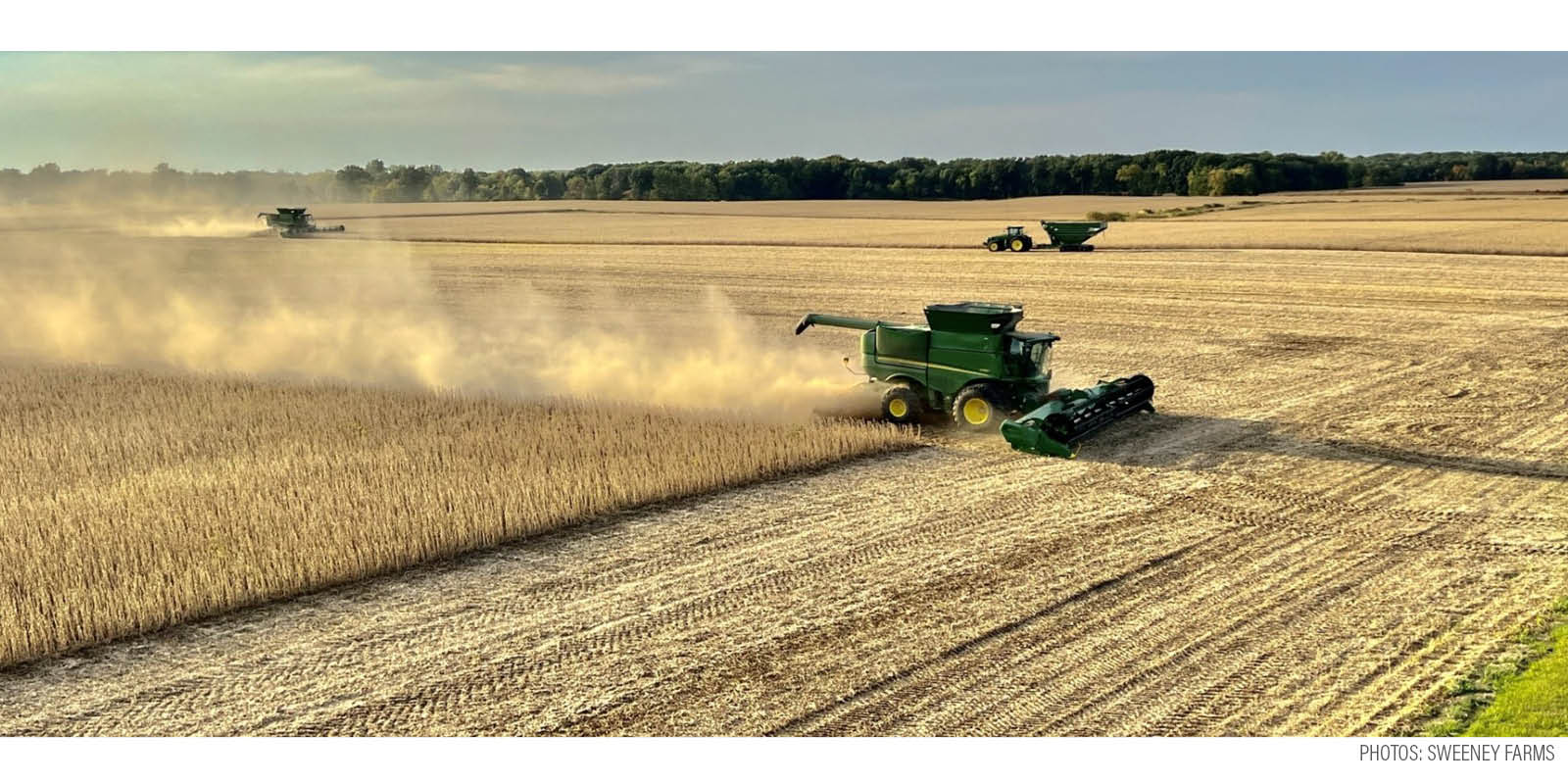Next-Gen Spotlight: Technology Is This Illinois Farmer's Forte

Kaden Sweeney is a seventh-generation farmer from Charleston, Ill., who returned home to work on the family operation following a stint at the University of Illinois. He and his wife, Libby, are raising the farm’s eighth generation, Cohen, now 1, and hoping someday she’ll help carry on the legacy. The 6,000-acre operation is owned by his father and two uncles, while he, his brother and a cousin are the next generation. The six men work together on the mainly corn and soybean farm as Kaden lives out a dream he has held since he was a kid.
What advice would you give other young farmers working with an older generation?
I think in order to reach your full potential, real-world experience is one of those most valuable things you can have, whether it’s your own or from someone before you. I certainly don't think you should underestimate the experience that the previous generation can give you. We've been fortunate on our farm. I have a dad, two uncles and my grandpa, who will be 86 this summer, still working at this every day. Don't tune that out, because there's a lot of good information that you can learn and it’s more than you ever would in the classroom.
I also think you should make as many connections and build as many relationships as you can in the industry. A professor told me that in school and I didn't really pay attention to it because I just thought I was going to go home and farm. I've been home five or six years now and its crazy how many people you know or need to glean information from at some point.

What has been the most challenging part about coming back to the farm as an official member of the team?
I think every kid that’s 18 or 22 thinks they know everything. Sometimes that can be a little bit of an adjustment. I came back from school and thought I had all the answers. Then I got back to the real world and things didn’t go like planned or like I thought it would. For example, my first year of farming was 2019, the middle of a trade war. The next year, COVID hit. Then the market rallied, and we had a few good years. Now land prices are crazy, and interest is high. It’s always something and you’ll need to learn to roll with the punches. It can be a little difficult sometimes to feel like you have it all figured out and realize that you don’t.
What’s the best advice you’ve ever received?
It comes from my dad and he says, “Control what you can control.” Farming, as a business in general, is kind of ridiculous because you have no clue what your revenues or expenses are going to be. It's pretty easy to get frustrated when the market's down or you're not getting rain. I think you learn with time and maturity, to just do the best you can and let the good Lord take care of the rest. He always does and we’ve found that to be true time and time again.
From a business standpoint, what’s the best thing you’ve learned since returning to the farm?
In a nutshell, the best thing I’ve learned is not to be afraid to ask questions. Along with that, sometimes you have to get out of your comfort zone and go searching for opportunities. That's something that doesn't come naturally to me. I think it's important whether it’s calling somebody you're looking to do business with or a neighbor farmer that you want to help or even potentially inquire about buying ground. Always have your eyes open to things you can do to improve your own farm and watch for ways to grow.

How important is technology to the farm?
Technology is extremely important for our farm. Obviously, auto steer has been around for a while now, but there are just so many things that build off it. Our combine creates a yield map. We take those yield maps and then turn them into variable-rate fertilizer maps in the spring. We have section control on everything so we're not over applying seed or chemicals. I've actually been working the last six months to remap all of our fields. I’m adjusting boundaries and building guidance lines directly off of them for each field so we’re farming as efficiently as we can. We don’t want to plant corn in a ditch and/or use the fewest number of passes possible. Autonomy is really pretty close. If they could figure out how to get machinery on the road without hurting people, I think it would be here. Technology is something that makes us more efficient overall.
As you look out into the future, what do you expect from technology?
I expect technology to be a hub for everything. We currently use the John Deere ops center to watch everybody work. You can monitor all your equipment from one place, and I think that will continue to expand. I can already get on my phone and change combine settings. At some point in my life, when machinery is autonomous, we’re going to have a command center with one or two people manning operations and watching the equipment remotely to make sure it's moving or to check fuel or speed and so forth.
Do you feel a responsibility to understand/manage technology on the farm because you are part of the younger generation?
I do and it's something I enjoy. I'm geared more toward technology, numbers and office work than being hands on in the shop. My cousin and my brother are excellent at the hands-on stuff. So, we gel well together. We'll have a meeting before fieldwork gets underway, and I'll share where things stand and what’s new for the upcoming year. As fast as technology can improve year over year, there’s always something new to go over.

What considerations do you make before rolling out a new piece of technology or equipment?
It starts with our precision guy because he farms too. He’s great at filtering out what we need to focus on. He tells us what’s fluff, what works and what hasn’t quite gotten all the bugs hammered out. Then we run it through the funnel. Does it fit in our operation? Is it going to be easy to implement? Is the learning curve going to be small? Is it going to make us better? That's the filter we use and it seems to work. For example, new this year we plan to control the grain cart from the combine. It takes some of the risk out of the grain cart driver's hands as it automatically latches to the combine. That's a new piece of technology for us which will make the team more efficient and somebody's life easier.
What advice would you give other young farmers that want to get into farming?
I certainly think there's an opportunity here and if somebody wants to do it, they absolutely can. I also believe you're going to get out of it what you put into it. If you aren't coming from a farm family, but you're interested, there are a lot of aging, close to retirement farmers out there without a next generation. So, I think making some phone calls and some hard work can go a long way. At the end of the day, people have worked their whole life on something and they want to know it’s going to be taken care of. Don't be afraid to ask questions. Don't be afraid to get uncomfortable as far as looking for opportunities or business connections. You can make strides if you find the right opportunity, and I think those are out there.







